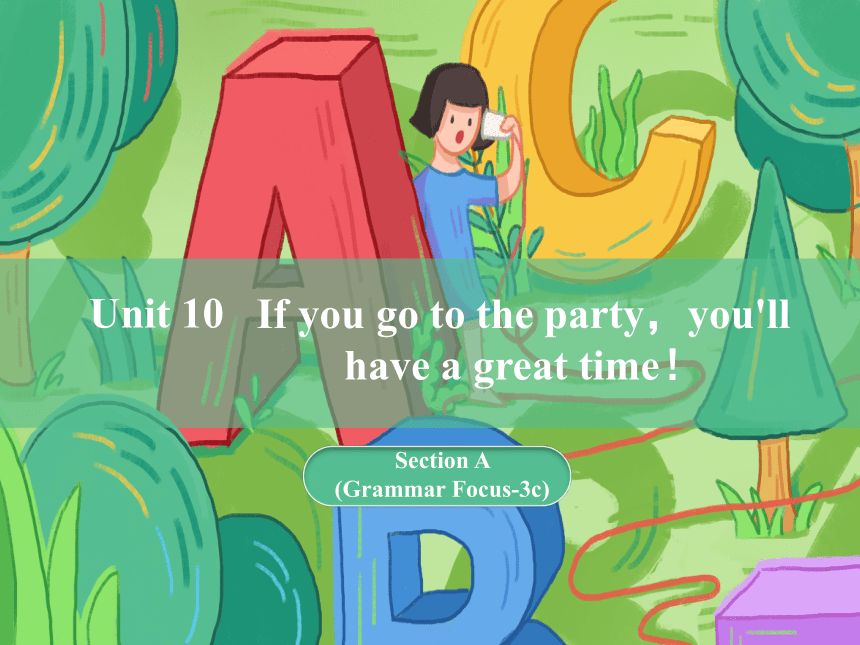(
课件网) Section A (Grammar Focus-3c) If you go to the party,you'll have a great time! Unit 10 什么是复合句?什么是主句,什么是从句,什么是条件状语从句?条件状语从句在时态方面有什么特点?如果同学们有疑问的话,这节课我们就一起来解开这些疑团。 Grammar Focus I think I'll take the bus to the party. If you do, you'll be late. I think I'll stay at home. If you do, you'll be sorry. What will happen if they have the party today? If they have it today, half the class won't come. Should we ask people to bring food? If we ask people to bring food, they'll just bring potato chips and chocolate. (一)if 引导的条件状语从句 语法讲解 考点 1 当主句用一般将来时时,if引导的条件状语从句用一般现在时,我们称之为“主将从现”原则。 eg:If it rains tomorrow,I'll stay at home. 如果明天下雨,我将呆在家里。 考向一 if 引导的条件状语从句的时态与主句的一致性。 【重点】 You will see many aunts dancing together on the square if it_____ in the evening. (连云港) A.doesn't rain B.rains C.will rain D.won't rain 【解析】本题用语法判定法。句意:如果晚上不下雨,你会看到许多阿姨在广场上一起跳舞。当主句是一般将来时时,if引导的条件状语从句用一般现在时(即主将从现)。 典例 A unless引导条件状语从句时,主句为将来时,从句用一般现在时表示将来(即主将从现)。unless本身就表示否定,在意义上相当于“if ...not”,其引导条件状语从句时与“if ...not”,两者可以互换。 eg:I will go there unless it rains. =I will go there if it doesn't rain. 如果不下雨,我就去那里。 【重点】 拓展 You won't pass the exams _____ you work hard. (遂宁) A.if B.unless C.so 【解析】本题用语境判断法。句意:如果你不努力学习,你考试就会不及格。unless除非;如果不,在意义上相当于if ...not。 典例 B 如果主句含有must,may,can 等情态动词, if引导的条件状语从句也用一般现在时。 eg:If you drive too fast,you may have an accident. 如果你开得太快,你可能会出交通事故。 考向二 考向三 如果主句是祈使句,if引导的条件状语从句同样用一般现在时。 eg:Tell Tom to ask Jack for help if he still has problems with his schoolwork. 如果汤姆学业方面还有问题,告诉他去找杰克帮忙。 if引导的宾语从句与if引导的条件状语从句的时态区分。 if引导宾语从句时,当“是否”讲,时态根据其主句而定:★当主句是现在的某种时态时,if从句的时态根据实际情况而定。★当主句是过去的某种时态时,if从句要用过去的某种时态。 eg:Lucy asks Tom if he'll travel around the world one day. 露西问汤姆他是否有一天会去环游世界。 I didn’t know if he was right or not before you told me that. 在你告诉我那件事之前,我不知道他是否是正确的。 考点 2 【难点】 —Can you guess if they _____ to play basketball with us —I think they will come if they _____ free. A.come;are B.will come;will be C.will come;are D.come;will be 【解析】本题用语法判定法。第一个if 引导宾语从句,意思是“是否”,由句意可知应用一般将来时。第二个if引导条件状语从句,且主句是一般将来时,从句应用一般现在时表将来。 典例 C (二)情态动词should 表建议 作为情态动词,should 符合情态动词的一般用法:后加动词原形(do);变否定句时在should 后加not,即shou ... ...

